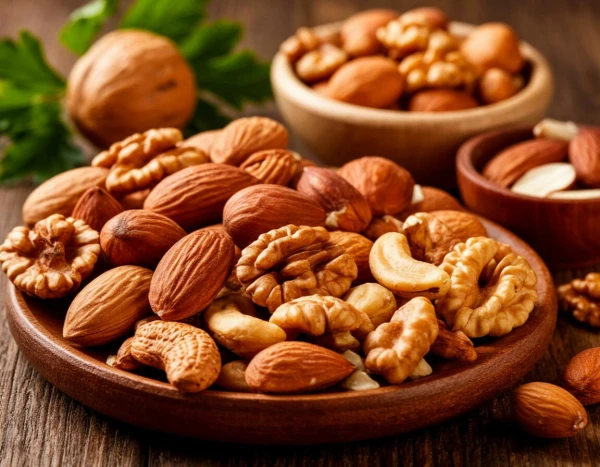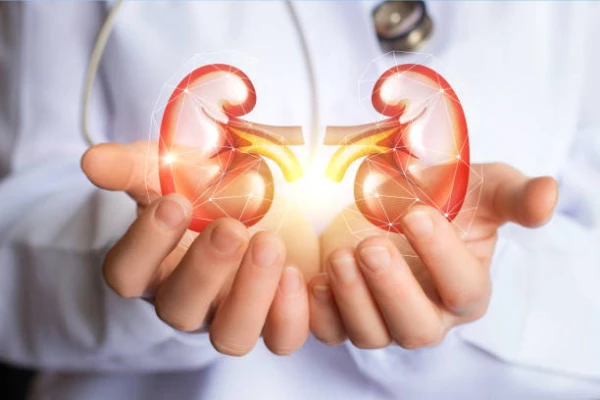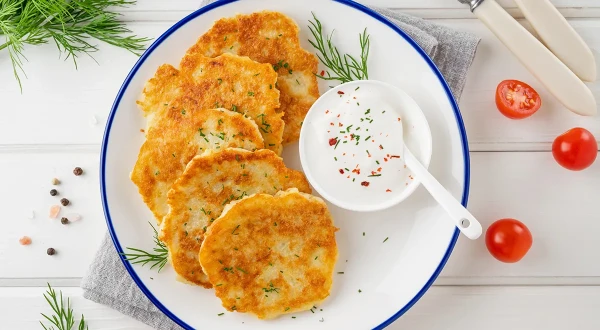
Which nuts are the most beneficial? And how long can nuts be stored to retain their benefits and not turn toxic? We asked the experts.
Numerous studies show that people who regularly eat nuts tend to have better health. Which nuts are the most beneficial? How often should they be consumed to provide real benefits? And most importantly, how should nuts be stored to preserve their miraculous properties? Experts provide answers.
"Nuts are carbohydrates, protein, but most importantly, they contain special fatty acids, antioxidants, and mineral elements that can correct the lipid profile of blood, reduce inflammation, and improve the functioning of the intestinal microbiome," says gastroenterologist Ali Almasri. "With an energy density of about 600 kilocalories per 100 grams, the key for health is the composition, not the calorie content.
The optimal therapeutic and preventive dose for adults is 25-30 g 5-7 times a week instead of part of other fat sources. For children aged 3-6 years, 10-15 g of nuts should be given, previously crushed.
A handful of fresh nuts daily reduces the risk of heart attack and type 2 diabetes, helps control body weight, and improves the nutrition of intestinal microorganisms."
"Nuts are a concentrate of nutrients, so regularity is important, not quantity. With regular consumption, nuts work for prevention: they strengthen blood vessels, stimulate brain function, and generally have a positive effect on health," says pediatrician Elena Sirotenko.
"Nuts are healthy food, but they are very high in calories. For example, 100 g of hazelnuts is about 650 kcal. You won't be able to fill up on that amount, but you will consume calories equivalent to a full meal," emphasizes nutritionist Irina Merkulova. "Moreover, there is a risk of overloading the pancreas, liver, and gastrointestinal tract, leading to nausea, girdle pain, dizziness, and allergic reactions. Therefore, stick to the daily norm, and to improve nut absorption, combine them with fresh vegetables and berries."
According to experts, to maximize benefits, it is better to consume different types of nuts. Here are the most beneficial among them.
Ranking of the Most Beneficial Nuts
1st Place — Walnut
The king among nuts. All the experts we surveyed recognized the walnut as the most beneficial.
"Walnuts are champions in alpha-linolenic omega-3 (2.5 g per 28 g serving) and melatonin. They help lower total cholesterol and low-density lipoproteins," says gastroenterologist Almasri.
In addition to omega-3 fatty acids, walnuts are rich in vitamins E and B, as well as magnesium and zinc.
"These substances support brain function, strengthen blood vessels, and help cells fight oxidative stress — a condition in which too many free radicals accumulate in the body — unstable molecules that damage cells, proteins, and DNA," explains pediatrician Elena Sirotenko.
According to the doctor, the antioxidants and healthy fats found in walnuts reduce inflammation of blood vessel walls and thus lower the risk of atherosclerosis and cardiovascular diseases. Additionally, this product is beneficial for vision.
"Russian scientist Ivan Michurin called walnuts 'the bread of the future' because their nutritional value is higher than that of butter and meat. They contain almost all the substances needed to maintain human health," says nutritionist Irina Merkulova.
2nd Place — Almond
Almonds take second place in the ranking of the most beneficial nuts.
"Almonds lead in vitamin E, magnesium, and calcium content. This nut helps reduce visceral fat and stabilize blood glucose levels," says gastroenterologist Almasri.
"The large amounts of magnesium, calcium, and antioxidants in almonds support the nervous system," notes pediatrician Sirotenko.
3rd Place — Pistachios
According to Elena Sirotenko, pistachios are champions in lutein and zeaxanthin content — pigments that support normal retinal function and strengthen overall immunity.
Gastroenterologist Almasri named pistachios the leader in protein content among nuts.
4th Place — Hazelnuts
"Hazelnuts are rich in monounsaturated fats and manganese and have a pronounced antioxidant potential," emphasizes doctor Almasri.
"This nut contains a lot of vitamin E and B vitamins, which help the brain function steadily and protect cells from aging," notes pediatrician Elena Sirotenko.
5th Place — Pine Nuts
A source of zinc, iron, and vitamin K. Additionally, pine nuts contain linoleic acid, which, according to experts, enhances the feeling of satiety. So, they are an ideal snack for those losing weight.
6th Place — Pecan
"Pecans are leaders in polyphenols. The lipid profile of this nut is comparable to olive oil," says gastroenterologist Almasri.
7th Place — Cashews
"Cashews contain a large amount of iron and copper. Additionally, these nuts have a low fat content," notes nutritionist Irina Merkulova.
Cashews also have a neutral taste that children enjoy.
8th Place — Brazil Nuts
According to gastroenterologist Almasri, one or two kernels provide the daily norm of selenium. However, excess selenium is dangerous. Selenosis is the name of this condition, which can lead to toxic effects.
Some may wonder why peanuts are not included in the ranking. The fact is that peanuts are not nuts; they belong to the legume family. However, they are also a very beneficial product.
"Peanuts are valuable for their arginine content. This amino acid is very beneficial for vascular health," says doctor Almasri. "However, peanuts are often contaminated with toxic aflatoxins produced by mold, so it is important to choose fresh, quality products."
Should Nuts Be Washed Before Consumption?
"Always wash nuts, even those from packets. Dust, fungal spores, pesticide residues, and biological traces of rodents and insects can easily remain on the surface of products. Rinse nuts with clean, hot water," says nutritionist Merkulova.
"The shell can be cleaned with a stiff brush. Shelled kernels can be rinsed and thoroughly dried — before roasting, the water must completely evaporate," recommends gastroenterologist Almasri.
Additionally, it is beneficial to soak nuts before consumption for 4–6 hours. This will reduce phytic acid content and improve mineral availability. However, pecans, pistachios, pine nuts, and Brazil nuts do not need to be soaked: they contain less phytic acid.
"After soaking, some nuts will lose their skin, along with tannins that inhibit the function of the pancreas and liver," emphasizes Irina Merkulova.
But should you specifically remove the brown skin from nuts? In the case of pecans, walnuts, and hazelnuts, it is better not to do so: their skin contains many antioxidants.
How to Store Nuts So They Don’t Lose Their Benefits
"Nuts quickly lose their beneficial properties when exposed to air, moisture, and sunlight. Therefore, it is ideal to store them in an airtight glass jar in a dark, cool place for no longer than six months, and shelled nuts for about three months, but no longer," says pediatrician Sirotenko. "Moreover, it is best to store nuts in the refrigerator to avoid an unpleasant taste."
Gastroenterologist Almasri believes that whole nuts in their shells can be stored for up to a year at temperatures not exceeding 20 °C, in the refrigerator for a year and a half, and in the freezer for up to three years. Shelled nuts will retain their benefits if stored for no more than three months in a dark cupboard, up to six months in the refrigerator, or a year in the freezer.
"The general rule for storage: dry, cool, airtight, away from fragrant products," emphasizes the doctor.
But what to do with old nuts forgotten on a distant shelf? Can they be used for baking?
"Darkening skins, the smell of linseed oil, bitterness, or mold indicate the oxidation of fats or contamination with toxic fungi. Heat treatment will not destroy aflatoxins, so such nuts should be discarded, not hidden in baking. This will not add flavor or benefits to the product," emphasizes the gastroenterologist.
"Nuts stored in damp or warm conditions are especially dangerous. Aflatoxins that may develop on their shells negatively affect the liver and gastrointestinal tract with regular intake," warns doctor Sirotenko.















Leave a comment